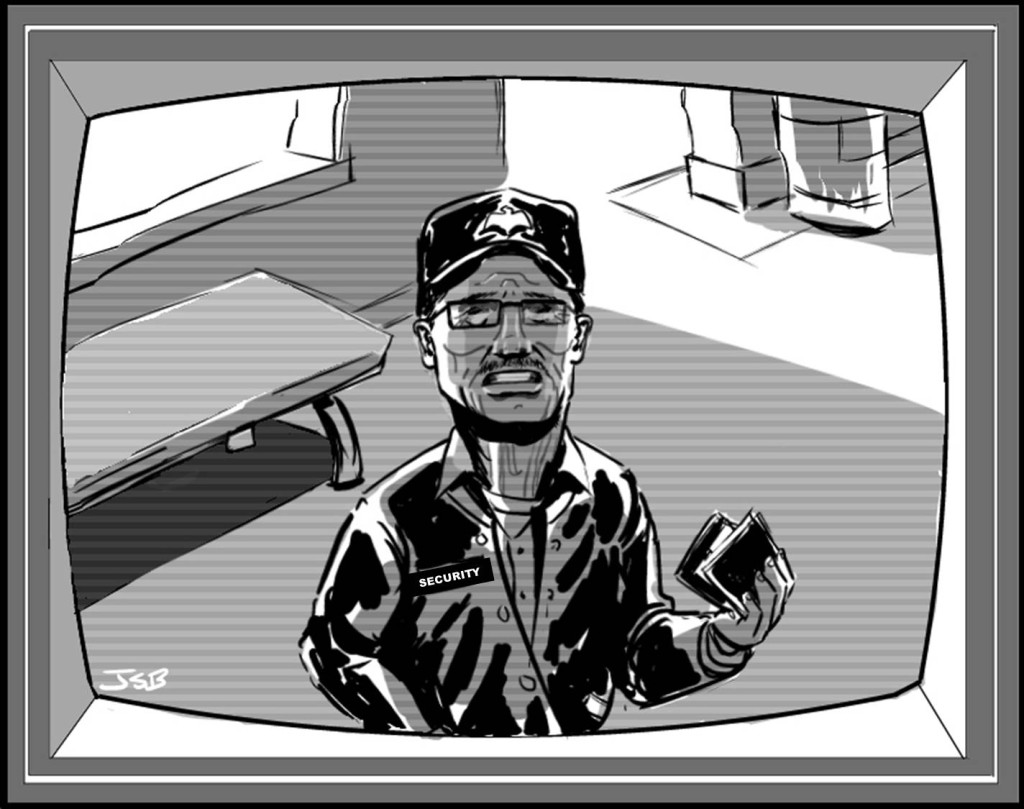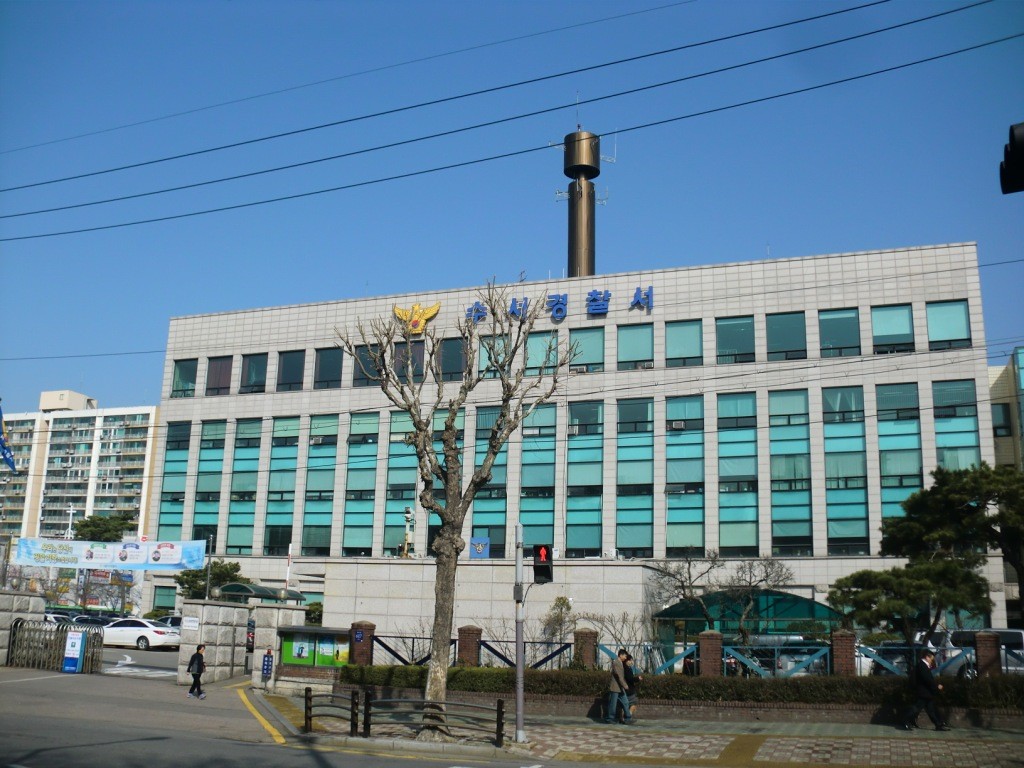By Iwazaru
Editor’s note: After having his wallet seemingly stolen, the author now tries to get some answers with the help of police and security staff. Those answers prove surprising.
Once I had changed into the sauna uniform, ochre t-shirt and long shorts, the owner led me into the sweltering main room where we wound through snoring, scratching and shifting bodies to a raised wooden platform under which the owner deftly ducked and pointed to a single spot next to a man sleeping flat on his back. I told him it was too hot to sleep but he motioned under with both hands and said, “rest, rest.” Resistance seemed futile–and I had nowhere else to go–so I lowered myself into the corner space and cursed my night of decision-making.

No sleep came as I started to sweat while listening to the snores, flatulence, cell phone rings, coughs and other sounds. And that is how the next three hours crawled along until I peeled myself off the hot floor, negotiated the still sleeping bodies and entered a locker room full of naked, drying, shaving and dressing Korean men who appeared to have some place to be. I hoped for no attention and got none aside from a few glances. I dressed quickly and returned my locker key to the same smiling owner who sat next to a middle-aged woman with a thick perm. “A foreigner!” she said, beaming, straightening her posture and bowing slightly. “His wallet was stolen,” the owner said, dimming her mood. “That is too bad,” she replied with a sigh. Behind them a TV carried the morning news.
“Did you sleep well?” the owner asked with a tone of concern.
“Thank you but it was too hot and I could not sleep,” I told him as I pulled my shoes from a shelf by the door. “I am sorry but it is a sauna,” he said with a smile. “Yes, yes,” I said, nodding my head and pushing open the thick glass door. “The police will help you,” he said with a nod. “Farewell.”
The building was already busy with people heading to work and a few of the shops in the lobby were open, serving drinks and snacks. I headed to the Ministop to get some juice, thinking that maybe, by an act of the gods, my wallet might sit on the counter. Pulling coins from my pocket, it hit me that I had nothing more. Outside I stood enjoying the cold, my bones shedding the sauna’s infusive heat. Meanwhile, I walked around glancing in random places, hoping that maybe someone, perhaps one of those crazy men the guards spoke of, had discarded my wallet, the cash gone but everything else there.
After I’d inspected most of the external area with zero luck, I returned to the lobby and just stood watching people and places. Across the way I saw several new, younger security guards and went to ask if they’d seen or heard anything about a lost wallet. At first, they looked surprised to see me then more so as I asked them about my missing wallet. They had not seen or heard anything. Had I contacted the police? It was clear nothing had been passed on from the previous guards. I left them to their duties and walked off, waiting for the clock to hit 9 a.m., the time I’d been told to call the police station. In the meantime, I messaged and called a few friends to let them know my predicament. I told two close Korean friends that I might need their assistance if things got too complicated with the language. That happened sooner than I expected.
A few minutes after 9 o’clock, I called the number on the card I’d been given and the officer on the other end sounded like he had no idea what I was talking about. I told him my name, where I was, the situation and my alien registration number–the police had taken all this down. “We do not have any information about that,” he said. “But I met the police here at 3 in the morning,” I insisted. “They took the information.” This did not help. I began to think I had the wrong number but he confirmed the station. Then I wondered if he understood me. He did, but he had no information. And thus the call reached a point of pointlessness. I had repeated myself, he had repeated himself and neither of us could solve the riddle. Hanging up, the bad dream had worsened. I quickly contacted a friend at work and explained the problem. He would call.
Around 10 minutes later he called back and said the officer he first spoke to, presumably the same man I had, knew nothing but, after a little prodding, he’d gotten another officer and the details of my case had been located on another desk. An officer would arrive at the Ventureville building within 30 minutes.
Sure enough, 15 minutes later a young officer walked into the now bustling building wearing the same grey winter police coat sans the cap. He was speaking on a cell phone as he surveyed the building. Standing across the lobby, I paused to see where he was headed. I expected him to approach the security guard counter but he walked right past it and the two guards toward the back corner of the building. I made my way to him.
After he turned and spotted me, we greeted each other with slight bows and I told him I was the one who had lost my wallet. We promptly made our way down the stairs to the scene of the supposed crime. I asked him about viewing the CCTV and he said we would try. By this time, the lower shops and restaurants were coming to life and an employee from the restaurant whose chairs I’d used asked the officer what had happened as we scanned the area. “A missing wallet,” he told him while looking up at a CCTV dome the size of a softball in the ceiling 10 feet behind the chair area. “We noticed the moved chairs but did not find any wallet,” replied the employee. The officer nodded his head and jotted something down on a notepad. We moved down toward the other end of the hallway.
Another larger CCTV dome protruded from the ceiling at the other end of the hallway (40 feet away) but the officer confirmed what I’d already observed—it pointed away from the area. “Only that one, if it is working,” he said, looking down the hallway as another officer appeared. A tall and stocky man, the newly arrived officer appeared a little older and higher ranked given appearance and interaction. He briefly acknowledged me and then asked the younger officer for an update. As they conferred, I heard mention of the “CCTV room” and shortly thereafter, the older officer told me to follow them.
Perhaps 20 minutes had passed since I met the young officer and we were headed down a basement hallway into a back corner of the 20-story building. We arrived at an unmarked steel door and the older officer knocked. After a short wait, a serious looking 30-something man in a grey sweater opened the door and respectfully told us to enter. Stepping inside, I first spotted a wall of maybe 100 10×10 inch television screens on the right, all with live CCTV feeds from inside and outside the building. Otherwise, the room looked like an aging office with cluttered desks and computer screens. The officers removed their shoes and stepped into slippers. The older officer handed me a pair to put on.
Meanwhile, the man in the gray sweater sat down at a desk with a large computer screen. I was politely ushered to a black leather sofa along the wall opposite the TV screens. The officers gathered around the man whose workstation sat ahead to my right. I had a limited line of sight to his computer screen, which now displayed perhaps a dozen live CCTV feeds. The younger officer told the man which camera to locate and the display began to shuffle until the officer pointed at a feed in the lower left. It happened quickly and for a second I recalled the officers the night before saying it would be very hard to get access to the CCTV.
Although he had already asked me about the exact time of my arrival and when I thought my wallet had been taken, the younger officer asked me again so I stood up and walked over to tell him again that I’d arrived around 2 a.m. and thought maybe something had happened around 2:30. The man in the sweater selected data from a drop down menu. The screen now displayed the full view from the camera and it soon showed me walking up to the spot just after 2. It’s the first time I’ve seen myself on CCTV and it was not a proud moment, though I did not look out of sorts—I was not stumbling or weaving. The black and white image showed me walking up, looking around, setting down my bag, taking off my coat, putting something(s) in the bag, sitting and then lying down.
At this point, a series of emotions engulfed me: First, I felt shame at my visual self sleeping on chairs in a public building; then satisfaction that my story was playing out as I’d described it to the police; followed by panic as I noticed that the cut camera angle might not capture what had happened; then relief as—by some grace of the gods—I realized my feet, bag and coat were in the camera’s capture area; and finally a building mix of excitement and anxiety and expectation as the man fast-forwarded the video to the 2:30 mark.
At 2:33, the man stopped the video. A shape had entered the screen from the bottom, which would have been from around the corner and past where my head lay. In dark hat and loose dark clothes, the figure stopped, turned its head back and forth, clearly assessing the scene. It then lifted my long, grey coat up and started to check the pockets. It was one of the security guards. Now, at this point, a thick silence entered the CCTV room as we watched. At first, I imagined the guard looking for an ID as to who the man laid out on the chairs might be. But, then, after finding nothing of worth in the coat, he began searching my bag. He did all of this slowly and calmly.
Soon I started to speak to the screen, saying, in Korean, “what is this?” as I watched the guard fish around in my bag. Not long after, he held my wallet. As he opened it, I asked, rather loudly in the silent room to, I think, the equally flummoxed officers and CCTV man, “why is this happening?” Sensing my increasing irritation, the older officer directed me back to the couch. I recalled Min, the night before, telling me that the officers said I could not enter the CCTV room even if they got access. I sat down.
From this point forward, the officers and the man went into a more serious investigative mode. I could still see part of the monitor and saw them replaying the scene, accessing other cameras where they tracked the man’s path to and from me. From what I could tell, he had quietly lifted my wallet, slowly returned to the main desk where the other guard waited, and then the two of them had begun rounds, which finally led them to waking me. Within minutes, an older police officer entered the CCTV room, clearly of higher rank, maybe chief, followed by several more men who appeared to be associated with the building’s security apparatus.
I called Min who had messaged me while we had been watching the security guard rifle through my things. “Where are you?” he asked right away. “In the CCTV room,” I answered. “It was the security guard.” There was a brief pause on the other end. “What?” Min asked. “It was the security guard,” I repeated. “The security guard,” he said as if I may have said the wrong thing. “Yes, he searched my stuff and took the wallet,” I added. As we spoke, one of the security staff sat at another computer and began taking screen grabs of the incident. Min offered any assistance he could provide and I told him I’d call if I needed anything. He sounded as incredulous as most of the men in the room looked.

I remained seated but could see that the police wanted an image that confirmed the guard’s identity. The CCTV cameras provided rather grainy footage and the guard’s hat hid his face from full view. Yet the man at the computer found another camera towards which the guard had walked and, just as he neared, raised his head slightly, revealing his face in full. The officers exuded evident approval at the angle and the image was enlarged. At this point, a middle-aged man in a black wool coat entered the room with two subordinates following–the head of security. Everyone in the room bowed in his direction and a quick briefing took place in lowered voices. The man glanced over at me from the circle of officials with flustered eyes.
Within a minute, from what I could understand, the effort to locate the security guard had begun. What was his shift? When did he finish work? Where did he live? How long had he worked there? The head of security spoke carefully into his smart phone while the police asked for certain evidence to be emailed. I sat, watched and listened. Not long thereafter, one of the police officers left the room and the middle-aged man approached the sofa. I stood, bowed and shook his hand. “As head of security for Suseo Hyundai Ventureville building, I want to tell you that I am very sorry for what happened to you,” he said as everyone looked on. He appeared genuinely sincere and disheartened as, honestly, all of the other men in the room did. I felt like all of them assumed some responsibility for what the elderly security guard had done. “We are very sorry,” the man repeated, looking at his staff. I nodded my head, said, “Yes, yes, I understand,” and thanked him.
The young police officer then told me we had to go to the police station. As we walked, he told me that they would do everything to find my wallet, that the guard was being located and that I would have to decide if I wanted to file charges. I nodded and thanked him. The humble one-story police station sat no more than 10 minutes away by foot. When we arrived, the chief was already there along with three other officers, two young women and an older man, who stood behind a counter. The chief told me to sit and soon he and one of the female officers, wiry with the face one might expect on a K-pop idol, approached with a paper. The chief spoke to me in Korean while the woman provided translation.
Their chief concern centered on whether or not I could write Korean characters. I could and so began the process of giving my statement. Meanwhile, the younger officer had taken the lead on processing the case, taking and making calls, analyzing and cataloguing evidence and verifying things with me. Again, the greatest challenge for me was recalling exactly what my wallet held in addition to confidently reporting where the wallet had last been. The video had shown the officer pulling it from my bag but earlier I hadn’t been 100 percent sure that it was there.
As I completed the statement form I realized my story was entering the official Korean public record. I bristled slightly as I chronicled the series of events and the chief and female officer looked on and at each other and back at me. A few more officers entered the station while we worked and all conferred with the young officer about the status of the case.
After I best itemized the wallet’s contents on the form, the chief moved closer to me and gently placed his right hand on my left thigh while asking in polite Korean if I wanted to bring charges against the elderly security guard. “Do you want to press charges?” the female officer repeated in English, while the chief stared into my eyes and held his hand on my leg. I suspect that if I hadn’t lived in Korea for years, I would’ve wondered why the hell this older man had his hand on my leg. Yet I knew it was a simple sign of care, of expressing a shared understanding of a difficult situation. So I pursed my lips, nodded, thought and said in Korean, “He’s a security guard.” The officers laughed instantly, the chief tapped his hand on my leg then removed it, and I wrote “yes” on the form. A different air entered the station as the officers were now tasked with a criminal case that would end up on some Seoul Prosecutor’s desk.
Not long after 11 a.m., the security guard schlepped through the front door of the station alone, a frailer and older looking version of what I had remembered, his thinning hair a swirling mess, his eyes downcast, his shoulders slumped. He wore sweatpants and a thigh-long brown canvas coat. My initial anger quickly melted to pity. “It’s not going to be a good New Year for this old man,” I thought to myself. An older officer, who seemed to be second-in-charge, directed him to sit down on the other side of the room from me, his back against the same wall as mine. I looked at him and just wondered why he’d committed the act, what drove him to risk his job and such a loss of face. The risk-reward made no sense. What anger I had only centered on the fact that he could’ve just taken the $30 and left the wallet. I told myself that I probably wouldn’t have noticed, that I might’ve just chalked it up to random stupidity and moved on. Simply, I would’ve paid more than $30 not to have been sitting in the police station wondering if I’d ever see my wallet again, not to mention all the fretting about replacing IDs.
After a minute or two, the younger officer, who had been preoccupied, stood up and asked the man what he had done with the wallet. Without hesitation, the man said he’d thrown it in a trashcan on the 7th floor of the building. “Hope!” I thought and then ran the scenarios through my head: the cans had been emptied; the cleaners were nearing the can any second–maybe now; a truck was loading the dumpster that held the bag with my wallet. I wanted to tell the officers to hurry but they had already sprung into action with the chief, the older officer from the CCTV room and the second-in-command donning coats and heading out the door with the security guard in tow.
For the next 30 minutes or so I spoke to the gods in silence. I crossed my fingers. I called to my wallet, summoning its return. And, as if someone(s) had been listening, a report came over the radio that the officers had recovered something. Fifteen minutes later, the crew came through the door and placed that object on the counter. Despite my urge to spring to my feet, I stayed seated and allowed the officers to proceed. As they itemized the contents, the old man sat down and began filling out his own report. Apparently, he was giving a full confession.
Not long after, the officers waved me to the counter and I felt a mixture of relief and loss as I stared down at part of my wallet—the insert. The larger outer part of my wallet wasn’t there. I tried to explain this to the officers and finally had to draw a picture. Yes, my cash, cards, IDs, some foreign currency and the gift certificate were there but all the business cards, notes, pictures and the mini knot tying guide were not. Hadn’t they seen the other part of the wallet? “This is all there was,” they answered. Then they turned to the security guard who looked up with empty eyes and said that was all he had in the first place. “No,” I told them all, “this is half my wallet.” For about 30 seconds everyone looked around incredulous and then the young officer said, “But we have this; we recovered the very important things.” And he was right. It’s a shame some items were gone but the officers had recovered the essentials. I thanked them and sat down.
At this point, I figured I’d be on my way but then the young officer told me we had to go to the main Seoul Suseo Police Center for further processing. He gave few details. It was now around 1 p.m. Both he and his partner from the CCTV room walked the old man out to the back of the Hyundai Sonata police cruiser and told me to follow. They directed me to get into the front passenger seat and then, oddly, they walked back into the station. The old man and I sat alone in the car, silent. I wasn’t sure I should talk to him but, finally, I asked, “Why in the world did you do that?” After a short pause, I felt a hand on my left forearm and I heard his wobbly voice not far behind my head. “Joesunghamnida…joesunghamnida.” Ten syllables spoken with the labor of contrition. I’m fairly certain that in all my life I’ve never felt someone expressing sorrier sentiments. I nodded my head and he leaned back into his seat.

Seconds later the officers emerged from the station, hopped in the car and we were soon speeding north up the freeway. Only sporadic police radio traffic filled the car. The main Seoul Suseo Police Station is a grey five-story rectangular structure with a guarded gate. The place was very quiet when we entered probably due to the time of day. We proceeded to the Criminal Investigation Division where we had to clear two levels of security, including what appeared to be a bulletproof door operated by a man in a secure booth. To our left was a cluster of maybe 20 desks, all unmanned except for one and to our right was a seating area where two officers sat behind long desks with PCs. One was speaking to an attractive young woman who sounded and looked distraught. The young officer told me to take a seat and wait to be called. Then, before I figured out that he was leaving, he had left. The old man and I sat with one seat between us.
The man behind the desk who called me came straight out of a Korean cop versus mafia movie. Perhaps nearing middle age, his hair was buzz cut, his eyes steely, his build stocky. He wore a collarless shirt beneath a seasoned black sports coat. He did not look particularly pleased with things in general. After calling me forward, he got right to business. “John,” he said in stern Korean, “what happened last night?” He did not introduce himself and it was clear we wouldn’t be speaking any English. Now, in front of him he had the whole file the young officer had compiled and submitted. He had my statement, all the pictures, everything. I soon figured out that he was going to make me verify my statement and everything that had occurred at the police station.
“John, who were you with and what were you doing on the evening of December 29?”
“John, how did you get to the Suseo Hyundai Ventureville building?”
“John, how were you laying and where was your bag?”
“John, what was in your wallet?”
“John, who stole your wallet? Is he here?”
“John, what did the police recover?”
One question after another. And though he laughed when, at times, I wrestled with my Korean, he helped me along and tolerated slips into informal usage of the language, something that’s considered disrespectful. When it was all said and done, he printed out a multi-paged document that contained my statements and had me sign across the folds of to verify its authenticity. Finally, he asked me where I was headed and directed me to the nearest subway station, Daecheong. I thanked him and as I walked to get my bag, the old man stood and held out his hand. I briefly turned and saw that the investigator was now standing and looking at us. I shook the old man’s hand as he apologized again. I nodded my head and walked to the exit where I was released to the late December afternoon, a smaller bulge in my back pocket than the night before
A few days into 2016, I got a text message from the Suseo Police notifying me that my case had been handed over to the Seoul Public Prosecutor’s Office. And that’s the last that I heard. Sometimes I think about the old man when I read about the poor state of affairs for Korea’s elderly—the poverty, the abandonment by families, the dying alone, the high suicide rates. I imagine he lost his job, his standing–or face–in the community, and who knows what else during prosecution; the police said he could go to jail for more than a year under the charge of larceny. Sometimes I wonder if I should’ve pressed charges, if it would’ve been sufficient for him to just lose his job and standing. I wonder why the hell I didn’t just head home on time that night or hail the right taxi. I wonder if that man had always been stealing things or if my random folly one night led him over the edge. I wonder if that CCTV or those chairs had been set a little differently, what story, if any, I’d be telling these many months later. I wonder.
Note: There is a print link embedded within this post, please visit this post to print it.
The post The Missing Wallet Part 2: When Security Catches Security appeared first on the3WM.
| Thethreewisemonkeys.com 3WM Social Media    |
|
'Hood News Art Event/PSA Expat Life Featured Fiction/Poetry
From the Scene Korean Life Politics Rant Review Student Writing Travel


